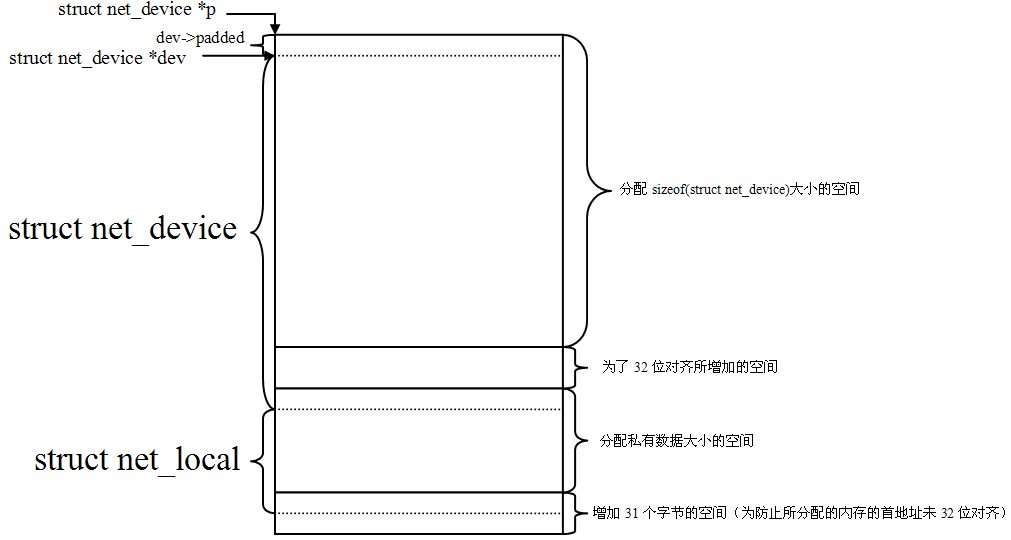开发平台:Ubuntu 11.04
编译器:gcc version 4.5.2 (Ubuntu/Linaro 4.5.2-8ubuntu4)
内核源码:linux-2.6.38.8.tar.bz2
1、如何分配struct net_device结构体以及私有数据
下面将通过实例来讲解Linux内核是如何通过alloc_netdev_mqs函数分配struct net_device结构体以及私有数据的(因为理解了这一点,就能完全理解netdev_priv函数的实现)。
首先,编写一个模块,代码如下:
/* tanglinux.c */
#include <linux/module.h>
#include <linux/types.h>
#include <linux/miscdevice.h>
#include <linux/fs.h>
#include <linux/netdevice.h>
#include <linux/etherdevice.h>
#include <linux/kernel.h>
#include <linux/ioctl.h>
#define TANGLINUX _IO('T', 1)
struct net_local {
int count;
char ch;
};
static int tanglinux_open(struct inode *inode, struct file *file)
{
return nonseekable_open(inode, file);
}
static long tanglinux_ioctl(struct file *file, unsigned int cmd, unsigned long arg)
{
struct net_device *dev;
size_t alloc_size;
size_t sizeof_priv = sizeof(struct net_local);
struct net_device *p;
switch (cmd) {
case TANGLINUX:
alloc_size = sizeof(struct net_device);
printk("first: alloc_size = %d\n", alloc_size);
alloc_size += 1; //为验证ALIGN的作用,人为制造net_device结构体的大小不是32位对齐
if (sizeof_priv) {
/* ensure 32-byte alignment of private area */
alloc_size = ALIGN(alloc_size, NETDEV_ALIGN); //#define NETDEV_ALIGN 32
printk("second: alloc_size = %d\n", alloc_size);
alloc_size += sizeof_priv;
printk("third: alloc_size = %d\n", alloc_size);
}
/* ensure 32-byte alignment of whole construct */
alloc_size += NETDEV_ALIGN - 1;
printk("fourth: alloc_size = %d\n", alloc_size);
p = kzalloc(alloc_size, GFP_KERNEL);
if (!p) {
printk(KERN_ERR "alloc_netdev: Unable to allocate device.\n");
return -ENOMEM;
}
printk("p = %p\n", p);
dev = PTR_ALIGN(p, NETDEV_ALIGN);
printk("dev = %p\n", dev);
dev->padded = (char *)dev - (char *)p;
printk("dev->padded = %d\n", dev->padded);
kfree(p);
return 0;
default:
return -ENOTTY;
}
}
static int tanglinux_release(struct inode *inode, struct file *file)
{
return 0;
}
static const struct file_operations tanglinux_fops = {
.owner = THIS_MODULE,
.unlocked_ioctl = tanglinux_ioctl,
.open = tanglinux_open,
.release = tanglinux_release,
};
static struct miscdevice tanglinux_miscdev = {
.minor = WATCHDOG_MINOR,
.name = "tanglinux",
.fops = &tanglinux_fops,
};
static int __init tanglinux_init(void)
{
printk("tanglinux driver\n");
return misc_register(&tanglinux_miscdev);
}
static void __exit tanglinux_exit(void)
{
misc_deregister(&tanglinux_miscdev);
}
module_init(tanglinux_init);
module_exit(tanglinux_exit);
MODULE_LICENSE("GPL");
然后,编译并加载此模块:
//获得Ubuntu 11.04正在运行的内核版本
$ cat /proc/version
Linux version 2.6.38-13-generic (buildd@roseapple) (gcc version 4.5.2 (Ubuntu/Linaro 4.5.2-8ubuntu4) ) #53-Ubuntu SMP Mon Nov 28 19:23:39 UTC 2011
//根据上面获得的信息,在Makefile中指定Ubuntu 11.04的内核源码目录为/usr/src/linux-headers-2.6.38-13-generic/
# Makefile
KERN_DIR = /usr/src/linux-headers-2.6.38-13-generic/
all:
make -C $(KERN_DIR) M=`pwd` modules
clean:
make -C $(KERN_DIR) M=`pwd` modules clean
obj-m += tanglinux.o
//编译,并把编译好的模块tanglinux.ko加载到内核中
$ make
$ sudo insmod tanglinux.ko最后,通过测试程序获得相关信息:
/* test.c */
#include <sys/types.h>
#include <sys/stat.h>
#include <stdio.h>
#include <fcntl.h>
#include <unistd.h>
#include <sys/ioctl.h>
#define TANGLINUX _IO('T', 1)
int main(void)
{
int fd;
fd = open("/dev/tanglinux", O_RDWR);
if (fd < 0)
{
printf("can't open /dev/tanglinux\n");
return -1;
}
ioctl(fd, TANGLINUX);
return 0;
}
//编译、执行测试程序,然后通过dmesg命令获得模块输出的信息
$ make test
$ sudo ./test
$ dmesg | tail -7
[19853.353282] first: alloc_size = 1088
[19853.353296] second: alloc_size = 1120
[19853.353306] third: alloc_size = 1128
[19853.353316] fourth: alloc_size = 1159
[19853.353348] p = cddf6000
[19853.353358] dev = cddf6000
[19853.353369] dev->padded = 0根据Ubuntu 11.04(基于X86硬件平台)中的配置,struct net_device结构体的大小为1088字节,刚好32位对齐,为了验证对齐函数ALIGN的作用,在例子中故意把struct net_device结构体的大小增加了1,所以第二次输出的alloc_size大小为1120个字节,也就是在1089个字节的基础上为了对齐增加了31个字节。
PTR_ALIGN函数的作用是为了使struct net_device *dev最终得到的内存地址也是32位对齐的。
上面所讨论的问题都可以通过下面的图示体现出来:

2、如何通过netdev_priv访问到其私有数据
netdev_priv函数的源代码如下:
static inline void *netdev_priv(const struct net_device *dev)
{
return (char *)dev + ALIGN(sizeof(struct net_device), NETDEV_ALIGN);
}
即通过struct net_device *dev首地址加对齐后的偏移量就得到了私有数据的首地址,如上图。








 本文详细介绍了Linux内核如何通过alloc_netdev_mqs函数分配structnet_device结构体及其私有数据,并通过实例展示了整个过程。同时解释了netdev_priv函数的作用以及其原理,提供了深入理解内核结构体分配机制的洞察。
本文详细介绍了Linux内核如何通过alloc_netdev_mqs函数分配structnet_device结构体及其私有数据,并通过实例展示了整个过程。同时解释了netdev_priv函数的作用以及其原理,提供了深入理解内核结构体分配机制的洞察。


















 被折叠的 条评论
为什么被折叠?
被折叠的 条评论
为什么被折叠?










